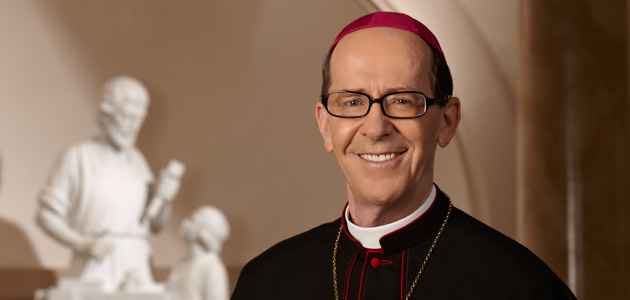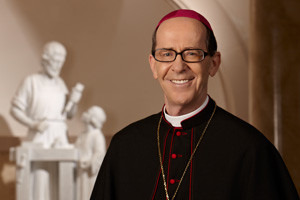

In the previous edition of The Catholic Sun, we spoke about the “scandal” of the Cross of Christ, which is not a real scandal at all but rather “the power of God and the wisdom of God” (Cf. 1 Cor 1:7ff). Now, let us turn to true scandals that seriously impede others from doing what is right and achieving their eternal destiny in heaven.
The Split between faith and life
A fundamental moral defect of our time, writes Pope Benedict XVI in Caritas in Veritate (#75), is “a conscience that can no longer distinguish what is human.” When we cannot perceive the difference between the rights of human persons and the rights of animals or when we do not recognize the equal dignity of every human person from the moment of conception until natural death, then we have lost our moral compass, and the door to horrifying human atrocities is opened. Then, people attempt to justify such evil acts as racism and ethnic cleansing, abortion and euthanasia.
How does this moral defect come about? Certainly it is linked to a crisis of faith, where faith in God is lost altogether, or where faith is divorced from daily life. The divorce between faith and life is one of the “scandals” specifically mentioned by the Second Vatican Council. In the Constitution on the Church in the Contemporary World (Gaudium et spes, #43), we read, “One of the gravest errors of our time is the dichotomy between the faith which many profess and the practice of their daily lives. As far back as the Old Testament the prophets vehemently denounced this scandal, and in the New Testament Christ Himself with greater force threatened it with severe punishment. Let there, then, be no such pernicious opposition between professional and social activity on the one hand and religious life on the other.”
Silence about Scandal
A failure to call evil by its name inevitably leads to more evil acts in the future. Evil acts, in themselves, are the greatest source of scandal. When the perpetrators are not called to account, then they are emboldened to do even worse deeds.
The Prefect of the Church’s Supreme Tribunal of the Apostolic Signatura, Archbishop Raymond L. Burke, in a talk delivered last September, argued that this failure to name scandal for what it is has had particularly harmful effects on society today: “In our time, there is a great hesitation to speak about scandal, as if, in some way, it is only a phenomenon among persons of small or unenlightened mind, and, therefore, a tool of such persons to condemn others rashly and wrongly. Certainly, there is such a thing as pharisaical scandal, that is, a malicious interpretation of the morally good or, at least, morally indifferent actions of another…. But there is also true scandal, that is, the leading of others, by our words, actions and failures to act, into confusion and error, and, therefore, into sin…. It is particularly insidious that our society which is so profoundly confused about the most basic goods also believes that scandal is a thing of the past.”
To remain silent about scandalous activity is not an act of charity; for charity is inauthentic if it is not linked with truth. Moreover, as we learned from the earliest pages of the Bible, from the story of Cain and Abel, we “are our brother’s keeper.” Fraternal correction is not an act of presumed superiority. It is an act of fraternal love that desires our brother to see and admit his mistake, to repent and find new life in the rich mercy of God. It is also an act of love for all those who might otherwise be led astray if the scandalous behavior were not publicly confronted.
In this regard, Jesus states quite emphatically (Lk 17:1-3), “Scandals inevitably arise, but woe to him through whom they come. He would be better off thrown into the sea with a millstone around his neck than giving scandal to one of these little ones. Be on your guard. If your brother does wrong, correct him.”
Not all scandal is the same
It is common knowledge that certain persons exercise greater influence than others in society. They may fulfill an office of greater authority, enjoy more popularity or prestige, or be in a position to exercise political, economic or spiritual power or to make decisions that impact a large number of people. The greater their influence the greater their ability to inspire what is right and good but also the greater their ability to give scandal.
Within the family, the example given by parents impacts in countless ways on their children. Parents are the first teachers of their children in the faith; they teach by actions even more than by their words. Their good deeds teach children what is right, while their sinful deeds set an example that leads the children astray.
Within the Church, clergy and religious exercise a major influence on the laity. Those who are holy inspire others in the pursuit of holiness. But the moral failings of religious and clergy cause great harm within the Church and society, and are a cause of much scandal. Sadly, the sexual abuse of children and youth by a small percentage of the clergy has reminded everyone of the devastating results of such scandalous behavior, and the need to decisively address this scandal.
Within society today, politicians, judges and others exercise major influence on key issues such as the dignity of human persons, the protection of marriage, and the exercise of religious freedom. When such public officials claim to be Catholic but fail to fulfill their role in these key issues, and especially when they justify such grievous omissions of responsibility by claiming they cannot “impose their religious views on others,” they give grave scandal. Their words and actions allow such fundamental evils as abortion and embryonic stem cell research to continue to kill thousands of the littlest and most innocent members of the human family. Their false argumentation also gives the mistaken impression that abortion is just a matter of religious opinion rather than a basic human right inscribed in every human heart.
Since some scandals are more grievous than others, remaining silent about the scandal given by those with greater influence in the Church or society has far more toxic effects than silence about other scandals.
In the next part of this series on scandal, we shall look at the roots of scandal, and then we shall consider what is scandal’s opposite: faithful and courageous service of truth.





![[VIDEO] Make Sunday feel like Sunday again](https://www.catholicsun.org/wp-content/uploads/2021/04/2021-YOUTUBE-BISHOP-MESSAGE-THUMBNAIL-ENGLISH-218x150.png)